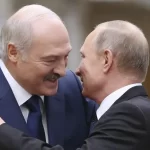Saudi Arabia is considering making a joint bid to host the 2030 FIFA World Cup along with Egypt and Greece, according to Tourism Minister Ahmed Al Khateeb.
Several other nations have already expressed their interest in serving as 2030 host and the vetting process by FIFA will be held over two years before a final decision is made in 2024, six years before the event.
Beginning in 2026, the World Cup will be expanded to a 48-team tournament, likely requiring future hosts to team up in order to host an event of that magnitude.
There have been only two joint bids in the history of the men’s World Cup, but several multi-nation proposals are already being formulated for 2030.
The first men’s World Cup tournament was held in 1930 and it has been held every four years except for 1942 and 1946 due to World War II.
The 2030 competition would be the 24th edition unless world governing body FIFA succeeds in making it a biennial event.
2030 FIFA World Cup bidding timeline & process
The bidding process was officially launched in the second quarter of 2022, and FIFA announced that a host will be chosen at the 74th FIFA Congress in 2024.
This means that the selected host will have six years to prepare for the 2030 tournament.
However, it’s possible that the selection will be done earlier, as was at one point considered with the 2026 World Cup.
In that case, the united bid of USA, Canada, and Mexico requested an expedited bidding process with no rival bid having been submitted at the time. However, FIFA refused this request, and ultimately Morocco came forth with a competing bid.
Spain, Portugal, Ukraine joint bid for 2030 World Cup
Spain and Portugal became the second official bid for the 2030 FIFA World Cup after their October 2020 announcement.
Known as the “Iberian Bid” in reference to the Iberian Peninsula on which these two nations lie, it is the second time they are bidding together for a World Cup, having been unsuccessful with a bid to host in either 2018 or 2022.
In early October 2022, it was announced that Ukraine would be joining their bid, with Ukraine looking to host one group.
With the new 48-team expansion, that means Ukraine would host three nations contesting three group stage matches.
Spain would serve as the main hosts for this tournament, with 11 Spanish venues to be selected from a 15-stadium shortlist.
Meanwhile, three Portuguese stadiums would be included, and an unknown number of Ukraine venues selected, although likely only one will be required to host the small number of matches contemplated.
Spain has previously hosted a World Cup, welcoming the 1982 tournament that saw Italy prevail.
Interestingly, Portugal, a rich footballing nation, has never hosted a World Cup previously, although the country has hosted a European championship in 2004.
Ukraine has also hosted a European championship, serving as joint-hosts with Poland in 2012.
Can Ukraine host 2030 World Cup matches?
Ukraine, currently at war with Russia, is an interesting addition to the European bid for the 2030 FIFA World Cup.
With the 2030 tournament still eight years away, it’s hard to imagine this conflict lasting that long, but it will still take years to prepare for the tournament, and it’s unclear what Ukraine’s capacity to do so will be in the next few years.
Still, with such a small number of matches to take charge of, their addition to the European bid could prove a valuable pull on the heartstrings of FIFA member nations, but also a tug at the wallets as they look to appeal to the emotions of viewing fans around the world.
Multiple reports state the bid has received the backing of Ukraine president Volodymyr Zelenskiy, who has become a popular and sympathetic figure worldwide as he looks to fend off the Russian invasion in the eastern portion of Ukraine.








